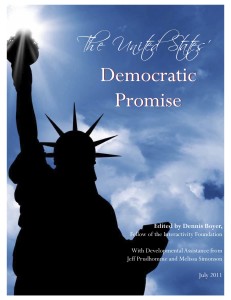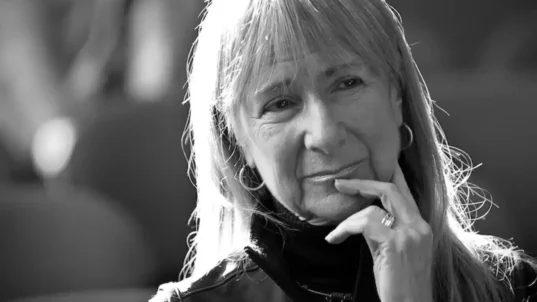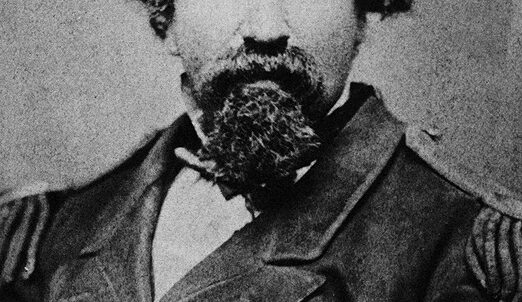 IF Fellow Suzanne Goodney Lea recently completed a Rotary Peace Fellowship in Bangkok, Thailand. While there, she had the chance to interact with twenty-one other Rotary Peace Fellows who were from, living, and/or working in seventeen countries. She engaged her colleagues in a series of IF discussions, exploring the Future of Sports and Society (which is an IF discussion guide that is in development), mental health in community (which is in its testing phase), and the completed report The United States’ Democratic Promise. The American Democratic Promise report was especially engaging to discussants. Fellows from India, Papua New Guinea, and Kenya were intrigued by the possibility “Democracy is a conversation.” How does that work in a society with 400 official languages…? We often lament that too many people speak Spanish (or some other language) here in the States, but by the second generation, the vast majority of immigrant families have assimilated to using English. The use of English is so widespread that some believe that English is our ‘official’ language. In fact, though, the U.S. has no official language. In countries with many tribal groups, there is typically some national language that many people can use, but the various tribal tongues are also officially recognized. How, then, does one conduct a coherent conversation about democracy?
IF Fellow Suzanne Goodney Lea recently completed a Rotary Peace Fellowship in Bangkok, Thailand. While there, she had the chance to interact with twenty-one other Rotary Peace Fellows who were from, living, and/or working in seventeen countries. She engaged her colleagues in a series of IF discussions, exploring the Future of Sports and Society (which is an IF discussion guide that is in development), mental health in community (which is in its testing phase), and the completed report The United States’ Democratic Promise. The American Democratic Promise report was especially engaging to discussants. Fellows from India, Papua New Guinea, and Kenya were intrigued by the possibility “Democracy is a conversation.” How does that work in a society with 400 official languages…? We often lament that too many people speak Spanish (or some other language) here in the States, but by the second generation, the vast majority of immigrant families have assimilated to using English. The use of English is so widespread that some believe that English is our ‘official’ language. In fact, though, the U.S. has no official language. In countries with many tribal groups, there is typically some national language that many people can use, but the various tribal tongues are also officially recognized. How, then, does one conduct a coherent conversation about democracy?
In Timor L’Este (East Timor), the world’s newest nation, there is an effort to actively engage citizens– who speak a mind-boggling array of languages (most educated people are fluent in three or more languages)– in a discussion about democracy. They are not “rebuilding the structures of democracy,” which is explored in the first possibility of the United States’ Democratic Promise, but are instead creating the foundation for democratic structures. There are currently many land disputes ongoing in the country because the idea of contracts and systems to objectively regulate land usage is a new concept borne of the democratic approach. Citizens must therefore be educated in how democracy is structured and functioned. My Rotary Peace colleague from Timor L’Este was so intrigued by this report as a useful tool to that end that he aspires to engage his fellow citizens in discussions of the report over the next year, leading up to their planned 2017 election. It will be exciting to hear how the report resonates there– and what they come to add to it!
While many nations actually do pretty well ensuring broad participation in their voting process (voting is often done on a Sunday or voting day is declared a national holiday), the idea of engaging modern technologies to make voting easier and more accessible was intriguing to all. Kenya has tried this, but the effort met with significant corruption. India has tried such approaches as well– with reasonable success. The key thing they learned was that it is critical that such e-voting services be provided and monitored by third party vendors who are independent and rigorously non-partisan. There is always a chance for corruption, but it is less likely if independent entities manage the process. What do you think: could e-voting work here in the States? Would you be more likely to vote if it were available?
We invite you to order some copies of this report and engage your friends, families, and/or neighbors in a discussion of it. Meet up around a pot luck over a couple of evenings and explore what folks think of the United States’ Democratic Promise. If you would like some tips for how to best plan and conduct a discussion, contact Suzanne Lea at [email protected]. She routinely trains faculty, students, and citizens to conduct IF discussions and is happy to share some tips. IF is always happy to share copies of our reports for use in small-scale dinner conversations in your neighborhood or community– or in classroom discussions at the K-12 or university levels. We are happy to talk with you about training people in your community or at your university to conduct exploratory, deliberative discussions. Happy exploring!



